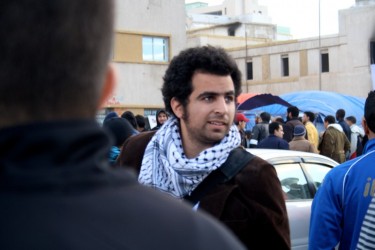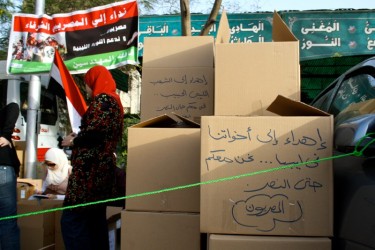This post is part of our special coverage Libya Uprising 2011 [1] and Egypt Protests 2011 [2].
From a geographical point of view, Libya is right next to the Egyptian western borders. And from a historical point of view, its on-going revolution seems to be the one that will succeed right after the Egyptian one in toppling a decades-old regime. The brutality of Gaddafi and his regime in Libya forced the Egyptian bloggers, with support from the community, to call for collecting donations and humanitarian and medical aid and carry them over the border to the Libyans.
Tarek Shalaby shared the details of his trip to Libya on Twitter. He and those who accompanied him also shared the photos [4], and videos [5] they took during their trip. It all started when Tarek announced the plan to go to the city Salloum [6], which is near the Egyptian borders with Libya, for anyone who'd like to donate or even join them on February 23. They then announced that they will gather first at Mostafa Mahmoud mosque in Cairo for people to meet them there.
The following day, Tarek tweeted:
According to the post Ali Azmy wrote later on in his blog [13], they succeeded in collecting around 40,000 Egyptian pounds within 24 hours, to buy medicine with them. Also, later on in Salloum they found at least 25 pick-ups loaded with medical aid donated by Orascom [14] and coordinated by the Arab Medical Union, and a long line of at least 250 empty micro-buses waiting to get into Libya to bring the Egyptians there back home.
They then started their trip to Salloum, about 2 hours late than the scheduled time [15], they had some rest in the middle and took some photos [16], then they reached El-Alamein road [17] where they caught up with the Arab Doctors’ convoy heading the same direction [18]. And finally, they reached Salloum at 2:00 AM [19] on February 25 – about 10 hours after they started their trip. They reached the border about an hour later on, but it came out that they had to spend the night in their cars [20] as they could not cross the border till the morning.
In the morning they continued their trip. Ali Azmy wrote about that part of the trip till they entered Libya [13], and how he wishes the borders between the Arab countries remain open in the future with no need for visas and passports.
The border was filled with people from different nationalities who were fleeing Libya. They served as Tarek Shalaby and his friends’ exchange bureau since they all wanted to get rid of Libyan money and get Egyptian pounds, and a Ghanaian called Agogo also sold them a Libyan phone SIM card [25] at the border.
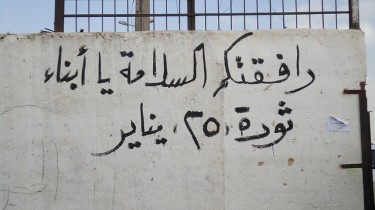 [26]A welcoming sign for those entering Libya. It says “Wishing a safe trip to the youth of January 25 revolutions, in reference to the revolution that took place in Egypt a month earlier”.
[26]A welcoming sign for those entering Libya. It says “Wishing a safe trip to the youth of January 25 revolutions, in reference to the revolution that took place in Egypt a month earlier”.Take from Tarek Shalaby's Flickr account under Creative Commons license
The ride to Libyan city of Tobroq was smooth [27], the city was peaceful [28], and the Libyans were extremely welcoming and generous with them. In fact, the Libyans generosity seems to be a pan-Arabian attitude to me after seeing this video [Ar] [29] of Tunisians offering endless aid to the Egyptians who fled from the western part of Libya to Tunisia.
The plan then was to stay in Tobroq [32] for the night and head out to Benghazi [33] the next day. They stayed in in Hostel called Maseera, which Tarek described as a luxurious one [34]. Once more, the Libyan owner of the hostel refused to take any money from them.
On February 26, the group headed to Benghazi.
The similarities between the different revolutions in Arab world was clearly seen. Almost the same people demonstrating in similar squares and taking care of the daily life tasks that were normally done by the regime and its forces.
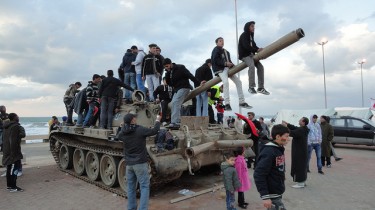 [42]Libyan kids playing on a tank in one of the squares of Benghazi
[42]Libyan kids playing on a tank in one of the squares of BenghaziPhoto taken from Tarek Shalaby's profile under Creative Commons license
Ali Azmy wrote about doctors they met there who they have also seen in Egypt earlier.
Tarek Shalaby and his friends continued to tour the city [44]. They witnessed the protesters there celebrating under the rain [45]. They also witnessed banners being drawn [46], and memorials being built for the martyrs [47]. Just like the rest of volunteers there, they all were waiting for the chance to go to Tripoli [48], but Tripoli isn't liberated yet and safety is not confirmed. They waited and waited, but it seemed that it wasn't possible to continue their trip towards Tripoli.
On February 27, the team headed back home.
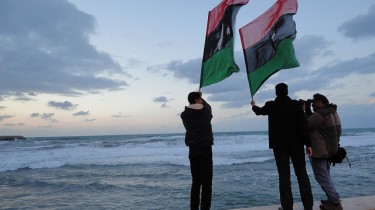 [51]Libyans waving their flag by the coast of Benghazi
[51]Libyans waving their flag by the coast of BenghaziPhoto taken by Tarek Shalaby under Creative Commons license
On their way back, Ali was busy asking himself, “When is the right time for intervention and what kind of intervention should it be?”
He then continued that he might find himself writing more posts about their trip in the future.
Finally, and after seeing the note written by Muhammad Ghafari [Ar] [52] about the similar trip he had in support to the Libyans, I believe we have to be thankful to people like Shalaby, Azmy and Ghafari for sharing their stories especially with the poor coverage the situation in Libya is receiving in mainstream media.
This post is part of our special coverage Libya Uprising 2011 [1] and Egypt Protests 2011 [2].
